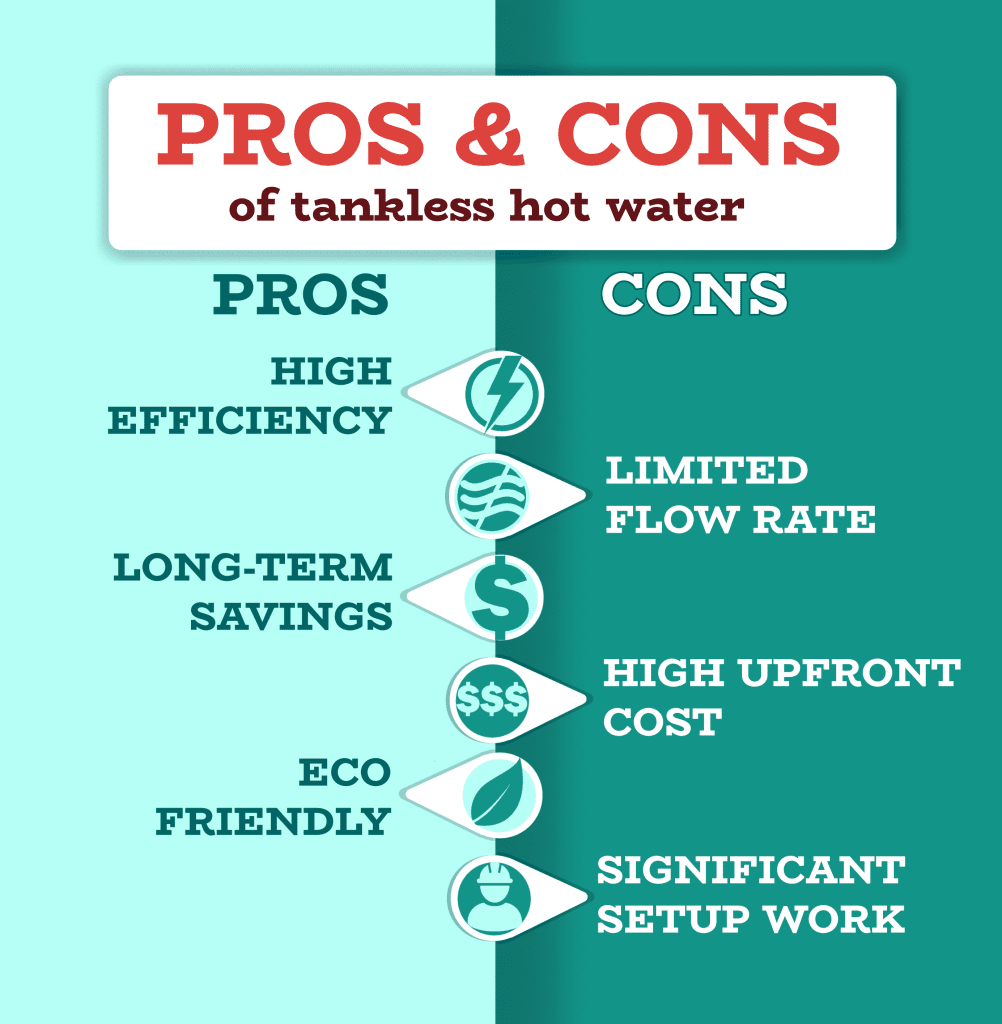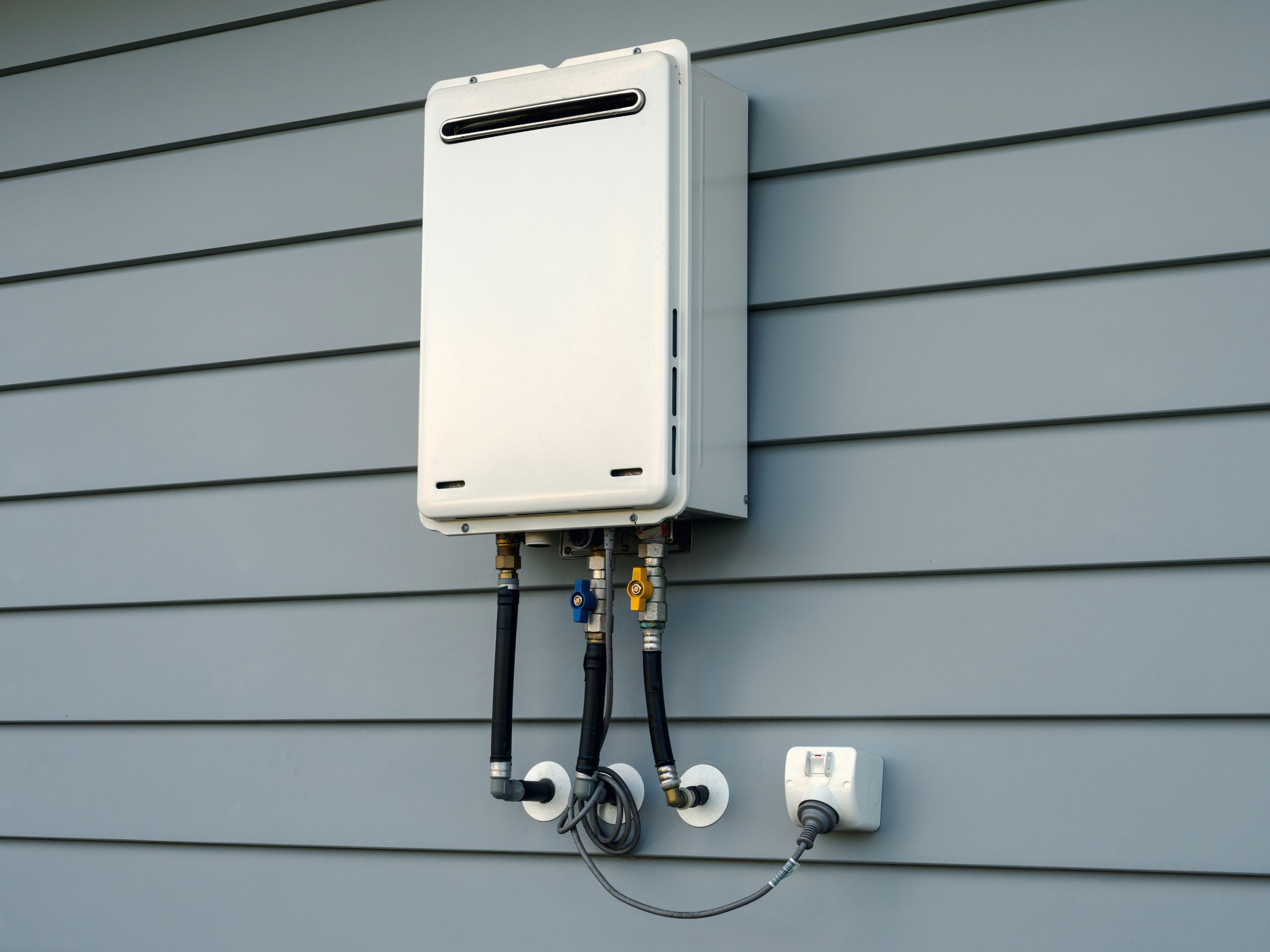Pros and Cons of Tankless Water Heaters
Pros and Cons: Where to Start?
Tankless water heaters can provide endless hot water, savings on your monthly energy consumption, and instant hot water for convenience and comfort. But for everything good there is always something lurking behind it that could be an issue. When it comes to the pros and cons of tankless water heaters, there are definitely a few cons to consider before you jump in and commit to this modern water heating technology.
Available fuel types, anticipated usage, and other factors matter when considering converting to tankless hot water. There are also budget considerations of short-term costs versus long-term gains. But don't worry, we'll break it all down for you and help figure out if an on-demand hot water solution makes sense for you.

Tankless Water Heaters
Tankless water heaters are on-demand water heating solutions unlike any tanked water heater you've ever had. Available to operate off of electricity, natural gas, or propane, these heaters are typically mounted on the outside of your home and are capable of providing never-ending hot water. Unlike more standard tanked options, tankless water heaters may or may not have any water storage capacity, instead heating the water as rapidly as it is flowing through it. This rapid heating and distribution creates the effect of 'endless hot water'.

The Pros
Compared against other water heating options, the pros and cons of tankless water heaters are starkly different. There are three primary pros for tankless water heaters:
High Efficiency
Efficiency doesn't just mean energy savings, it means efficient water heating. This is what provides the never-ending effect of a continuous hot water supply. Utilizing advanced technology, a tankless heater will heat the water as fast as it flows through it. This means you can get in the shower, crank it up to the hottest setting, and never run out of that hot and steamy goodness.
Long-Term Savings
Over time, tankless heaters provide substantial energy savings through lower energy consumption. This saves you money over the years by keeping your gas or electric bill lower.
Eco Friendly
If you're environmentally conscientious, the energy savings you'll receive with a tankless water heater means more than just saving dollars on your utility bills. Using less energy is good for our environment and a necessary part of taking care of our planet.
The Cons
Like with anything, there are always drawbacks. While tankless water heaters offer several advantages, there are negative considerations to not forget about:
Limited Flow Rate
Since there is no reserve sitting in a tank, your hot water output is limited to the flow rate specifications of your selected unit whereas a tanked unit will run at the flow rate coming from your water main. Consequently, smaller tankless water heaters often cannot support more than one or two fixtures running at the same time. This can be overcome by sizing up your unit, but the more you size it up the more costly it gets.
High Upfront Costs
Compared to the more common tanked water heater, a tankless water heater is much more expensive. Often as much as three times the cost of a standard tanked heater, it can take years of energy savings to recoup the high installation costs.
Significant Setup Work
Since tankless heaters are typically installed on the outside of your home, if you're converting from a tanked to a tankless it is unlikely your water lines and gas lines are already in place for it. This is part of what can drive up the cost of the installation, and it means a lot more setup to prepare your home for endless hot water.
Fuel Types
When it comes to never-ending hot water, fuel type matters. A tankless can be purchased for electricity, natural gas, or propane, but there are significant differences between them. If you've decided the pros of a tankless water heater outweigh the cons and you're ready to upgrade, consider next your fuel type. You may be limited based on what is available in your area, and not all fuel types will provide the same result.
Natural Gas Tankless Water Heater
Pros
- Higher capacity, up to 11 gallons per minute
- Faster, more reliable heating ability
- More efficient than propane, oil, or electricity
- Less expensive than propane, oil, or electricity
- Less likely to need upgrades to existing utility services
Cons
- Requires venting
- Negatively impacted by lower oxygen levels in high altitude areas
- Requires annual maintenance
Propane Tankless Water Heater
Pros
- Higher capacity, up to 11 gallons per minute
- Faster, more reliable heating ability
- Available in rural areas where natural gas may not be
Cons
- More expensive than natural gas
- Requires venting
- Negatively impacted by lower oxygen levels in high altitude areas
- Requires annual maintenance
- If you do not currently have propane available, you'll need to have a tank installed and arrange service
Electric Tankless Water Heater
Pros
- Can be used in a complimentary fashion to tanked heaters
- Less expensive
- Good for low-use applications
- Requires very little maintenance
Cons
- Less heating and therefore lower flow rate, usually maxed at 4 gallons per minute
- Might require electrical upgrades to your home to support it
- Not suitable as a whole-home water heating solution
Unsure What Type is Best for You?
Our licensed plumbers are happy to help you figure out the best solution for your water heating needs. Whether it is a tanked heater or simply the most efficient water heater option for your situation, we can help. Give us a call today to schedule your free assessment.